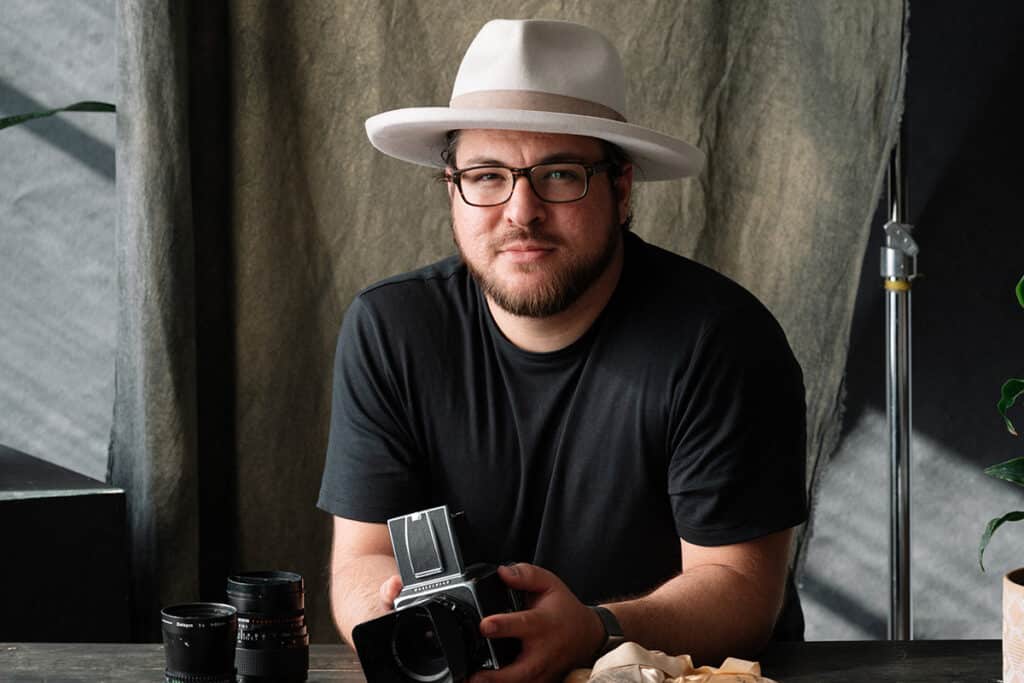Not long ago, grants manager Mara Posada was sitting in her office at the Guadalupe Cultural Arts Center when a realization struck her: She and her employer are practically birthday twins.”
The Guadalupe and I grew up together,” Posada says with a smile. She’s 25 years old. In the coming year, the West Side arts organization will celebrate its 25th anniversary. Posada may not have been born at the center, but she got there as fast as she could.
At age 7, she was taking dance classes at the Guadalupe when her mother heard about a new drama program there. Young Mara became a founding member of the children’s theater group that’s now called Discover Animo. Among other parts, she played the title role in an adaptation of the folk tale “Why Mosquitoes Buzz.” Bitten by the theater bug, Posada remained involved with Guadalupe productions through high school, graduating to Grupo Animo for teenagers and acting in other plays with adults.
As she moved from Esperanza Elementary School to Sul Ross Middle School and Clark High School, Posada regularly attended rehearsals that ran as late as 10 p.m. “People would ask my mother, ‘Do you think it’s all right for her to be doing this?'” Posada remembers. “She’d say, ‘Yes, it’s all right with me.'”
As eldest of three children, she has been the trailblazer for her family, headed by Jorge Posada, a welder, and Blanca Posada, a data-entry clerk, and including sisters Melody, 21, a student at Texas State University, and Evelyn, 12, a seventh-grader at Sul Ross. Both parents were supportive of her activities at the Guadalupe and other venues, making the lengthy drive from their home near Ingram Park Mall as often as needed. “My mother was especially great at finding programs I might enjoy and learn from,” Posada says. “When I was a kid she would take me all across town for free dance classes and summer programs at Parks and Recreation centers. From her, I learned to be outgoing and resourceful.”
If there was a high point in her youthful acting career, she says, it was at age 11, when she played a young teenager in “Las Tandas de San Cuilmas/Los Carperos,” a play wrapped around the legend of the devil in disguise, who attends a dance and is revealed only when the partygoers catch sight of his chicken’s feet. Posada’s character begs her older sisters not to go to the dance; while she was delivering this emotional speech, she says, “I could feel the energy I was projecting bounce back from the audience. There was excitement on both sides (of the stage), and it was one of the first moments I realized how powerful live theater can be.”
Through her mother’s efforts, Posada says, “I had a culturally and educationally rich childhood.” Making sure it all worked together, however, was up to her. At the Guadalupe, for instance, the young actress brought her homework to do whenever her character wasn’t in a scene. “I had a planner when I was 12 years old,” she says. “A 30-year-old woman I was acting with saw me checking it and said, ‘You have a planner? I don’t even have a planner!'”
Throughout high school, Posada kept on acting at the Guadalupe, while playing basketball and volleyball, making the National Honor Society and belonging to other school clubs. During the summer, she took part in the summer PREP program at the University of Texas at San Antonio, exploring the possibility of a career in engineering. “Acting taught me discipline, it taught me priorities,” she says. “Keeping busy still gives me the structure I need to get things done.”
Excellent grades and a varied extracurricular life helped Posada get accepted at Cornell University in Ithaca, N.Y. “I had never been out of Texas, and I wanted to leave the state,” she says. Cornell, she says, was “a different environment” — maybe a little too different. Though Posada enjoyed her first year of college at the Ivy League school in upstate New York, culture shock and wind chill prompted her to transfer to Stanford University in Palo Alto, Calif. — another prestigious school in a warmer climate.
There, she majored in English, worked on creative writing and participated in the school’s Latino-oriented Teatro America Workshop, balancing her interest in the arts with courses in statistics and computer science. She honed her Spanish proficiency by spending a quarter in Barcelona, Spain, and traveled in Germany as one of 12 counselors selected to lead a high-school tour group with Parade magazine’s Young Columbus program. Posada even managed to come back to PREP as a teaching assistant, helping with an introductory physics course.
“That was my first experience of coming back full circle,” she says, though she believes she has been influenced by her father, who makes a point of returning at least twice a year to his hometown of Rio Bravo, Tamaulipas, Mexico, about 20 miles from the border at Pharr. “He has been in San Antonio for more than 30 years,” she says, “but he has never stopped going back.”In college, Posada also found time to work on the Stanford Daily, the school’s newspaper, but not as a writer. As an advertising executive, she worked with corporate clients, including many recruiters. “The business aspect (of publishing) intrigued me,” she says. “It was a fun job, fast-paced, and I learned a lot about meeting deadlines and negotiating contracts.”
This practical background helped her get internships with the Mexican Heritage Corp. in San Jose, Calif., and with the Esperanza Peace and Justice Center in San Antonio, where she worked with event planning and learned more about what makes nonprofit organizers tick. At Esperanza, she says, “Everyone was there because they believe in their mission. They have a passion for their center.”
After helping to plan Nuestra Graduacion, a Chicano commencement celebration at Stanford, Posada decided to move back to Texas. She had considered working toward a master’s degree in English but wanted to take a break before embarking on graduate studies. While living briefly in Austin, Posada attended the Guadalupe’s annual Inter-American Book Fair in the autumn of 2002. On an impulse, she sent an e-mail to the center’s executive director, Maria Elena Torralva-Alonso, “telling her how much I had enjoyed the conference and that I thought it was a great event.” Torralva-Alonso responded by asking her to send her résumé; by January 2003, Posada was hired for her present position as grants manager.
Taking the job at the Guadalupe —where photos of the original Grupo Animo hang on her office walls — was “coming back to my roots,” she says. “San Antonio is where I grew up. I owe so much to this community, and I want to see that others have the same opportunities that I had.” The job also is giving her a fuller picture of the way arts organizations work, while drawing on the abilities she has developed as a theater artist.
As grants manager, Posada uses her writing skills to describe the center’s programs on grant applications to national foundations, such as Ford and Rockefeller, as well as local foundations and corporate funders. The grants process, she says, “requires a lot of listening,” especially to other Guadalupe staff who “help me understand what they need for what they want to do.” Her work also includes establishing contact with the wider community, connecting the center with a range of audiences. “No matter how wonderful a project is,” she says, “without funding, without an audience, it won’t come to fruition.”
Posada acknowledges that she entered the field during a challenging time for fund-raisers. “Given the economy, it has been difficult in the arts,” she says. Some funders have allocations for basic emergency needs, such as food and shelter, but fewer resources available for the arts. “This is a competitive time for fund raising,” Posada says, “but we’ve been here for more than 25 years. (The Guadalupe) is fiscally responsible, and we have met crises like this before and survived.”
Posada, who is single, spends a lot of her free time attending events at the Guadalupe and other cultural institutions. “I’m at my happiest when I’m involved in the arts,” she says. “It’s a great stress reliever for me.” Last fall, she helped Grupo Animo players put on a show in an empty lot, turning on the headlights of her car to serve as stage lights. She also took a small role as a member of the procession in “Posada Magica,” the Guadalupe’s Christmas play about Las Posadas, the traditional re-enactment of the Holy Family’s journey in Bethlehem.
In her infrequent hours at home, Posada works on short stories, some based on tales told her by her grandmother, Julia Herrera. Family gatherings are another source of inspiration. “We meet at all the major holidays and have a ball,” Posada says, “taking pictures of all the kids, making tamales, enjoying the food smells, the laughter, even the arguments.”
Her next move, most likely, will be to begin law school in the fall. After she graduates, Posada hopes to return to San Antonio to serve as a legal resource for arts organizations, helping them to achieve nonprofit status, reviewing contracts and otherwise helping to develop the cultural side of her hometown. Whatever her eventual career focus, she expects to remain an advocate for the arts.
Author: Paula Allen
Photographer: Liz Garza Williams




